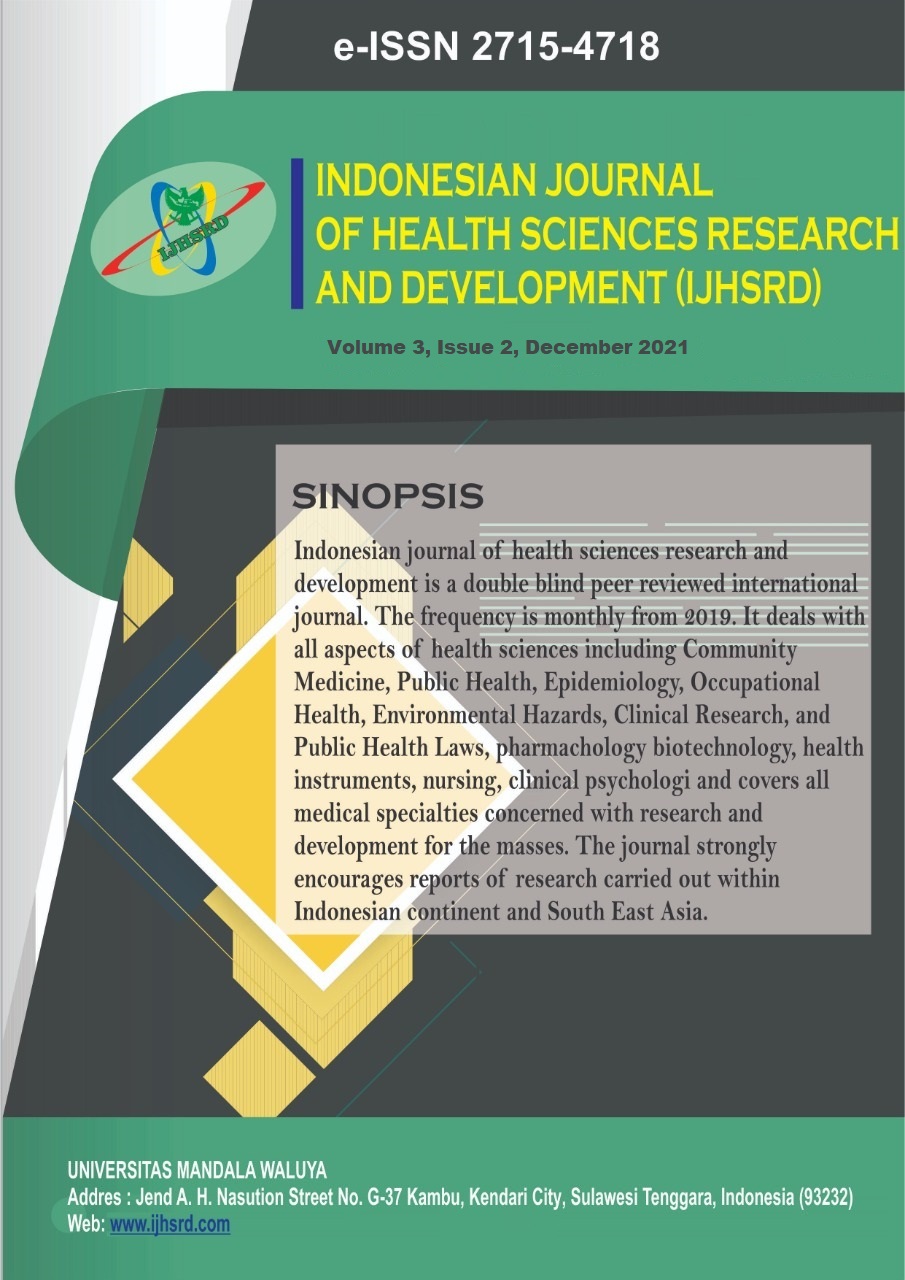Main Article Content
Abstract
Background: The preliminary survey in Soropia Health Center on 10 (ten) mothers who had toddlers, there were 8 (eight) people (80%) lacking personal hygiene and 2 (two) people (20%) having sufficient personal hygiene, and then 6 (six) people ( 60%) environmental sanitation is sufficient and 4 (four) people (40%) were lacking. In terms of food processing, there were 7 (seven) people (70) food processing in the poor category and 3 (three) people (30%) food management is adequate , then 4 (four) people (40%) who used drinking water in the less category and 6 (six) people (60%) used drinking water in the sufficient category, the survey also show that the knowledge of mothers who had toddlers was mostly 7 ( seven) people (70%) in the poor category and 3 (three) people (30%) in the sufficient category.
Methods: This type of research is quantitative with Quasy experimental design. The population in this study were all toddlers aged 0-59 months who experienced diarrhea in the work area of the Soropia Health Center, Konawe Regency in 2020 as many as 79 people. The sample size is 66 respondents which are divided into two, namely 33 respondents in the intervention group and 33 in the control group. The sampling technique of treatment and control used simple random sampling and control.
Result: This researchfound a p value of 0.000 < 0.05 for personal hygiene, and the use of drinking water.
Conclusion: There is an effect of personal hygiene and use of drinking water on efforts to prevent diarrhea in children under five in Soropia Health Center, Konawe Regency.
Keywords
Article Details

This work is licensed under a Creative Commons Attribution-ShareAlike 4.0 International License.
References
- Ministry of Health R. Main Results of 2018 Basic Health Research. Jakarta: Health Research and Development Agency, Ministry of Health of the Republic of Indonesia. 2018.
- Southeast Sulawesi Provincial Health Office. Southeast Sulawesi Provincial Health Office Profile 2020. Kendari: Southeast Sulawesi; 2020.
- Konawe Health Office. Cases of Toddler Diarrhea. Konawe Health Office, Southeast Sulawesi; 2020.
- Juariah S, Yusrita E, Darmadi D, Irawan MP, Kurniati I. Introduction, Monitoring and Counseling on the Importance of Personal Hygiene at Sman X Pekanbaru. Multidisciplinary Community Service Journal. 2018;1(3):254-9.
- Apriany D. Differences in hand washing behavior before and after being given health education to children aged 4-5 years. soedirman nursing journal. 2012;7(2):60-6.
- Fitriani A. The effect of counseling interventions using leaflet media on changes in knowledge about the potential dangers of contact dermatitis and its prevention in Cleaning Service workers at Syarif Hidayatullah State Islamic University Jakarta in 2013. 2013.
- Notoatmodjo S. Public Health Sciences and Arts,Rineka Cipta. Jakarta; 2014.
- Effendi R, Salsabila H, Malik A. Understanding of sustainable environment. Module. 2018;18(2):75-82.
- Gani HA, Istiaji E, Pertiwi PE. Clean and healthy living behavior (PHBS) in the household arrangement of the Using community (Qualitative Study in Kemiren Village, Glagah District, Banyuwangi Regency).IKESMA. 2015;11(1).
- Irmawati I. Overview of helminthiasis in children aged 6-12 years with unavailability of family latrines (Study in Sudimoro Village, Megaluh District, Jombang Regency):STIKes Insan Cendekia Medika Jombang; 2016.
